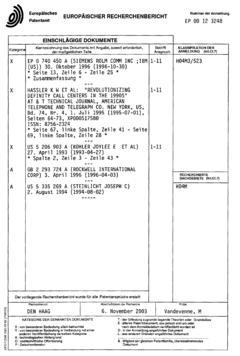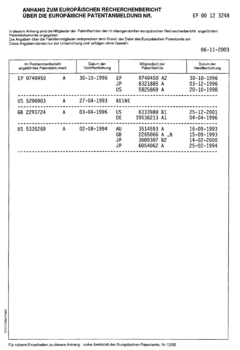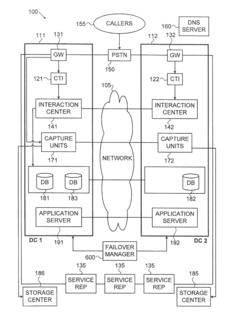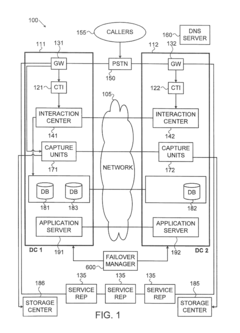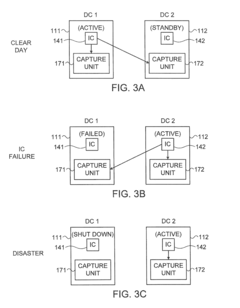Quantum Algorithms for Revolutionizing Call Center Operations
JUL 17, 20259 MIN READ
Generate Your Research Report Instantly with AI Agent
Patsnap Eureka helps you evaluate technical feasibility & market potential.
Quantum Call Center Evolution
The evolution of quantum call center operations represents a paradigm shift in customer service technology. This transformation is driven by the integration of quantum computing principles into traditional call center systems, promising unprecedented efficiency and capabilities.
The journey began with classical call centers, which relied on conventional computing systems for routing calls, managing customer data, and providing basic analytics. These systems, while functional, were limited in their ability to handle complex queries and optimize large-scale operations in real-time.
As quantum computing research progressed, researchers began exploring its potential applications in various industries, including customer service. The first theoretical models for quantum-enhanced call centers emerged in the early 2020s, focusing on optimizing call routing and queue management using quantum algorithms.
By the mid-2020s, early prototypes of quantum-assisted call center systems were developed. These systems utilized hybrid quantum-classical architectures, where quantum processors worked in tandem with classical computers to enhance specific aspects of call center operations, such as predictive analytics and natural language processing.
The late 2020s saw the implementation of more advanced quantum algorithms in call centers. Quantum machine learning techniques were applied to improve customer sentiment analysis and personalization. Quantum-inspired optimization algorithms significantly enhanced workforce management and call routing efficiency.
As quantum hardware continued to advance, the 2030s marked a significant leap in quantum call center capabilities. Fully quantum systems began to emerge, capable of processing vast amounts of customer data in real-time, predicting customer needs with unprecedented accuracy, and optimizing complex multi-channel communication strategies.
The integration of quantum error correction and fault-tolerant quantum computing in the mid-2030s further solidified the role of quantum technologies in call centers. This advancement allowed for more reliable and scalable quantum operations, enabling even larger call centers to benefit from quantum-enhanced capabilities.
By the 2040s, quantum call centers had become the industry standard. These advanced systems leveraged quantum entanglement and superposition to provide instantaneous, personalized customer experiences across multiple channels simultaneously. Quantum-powered natural language processing and real-time translation services broke down language barriers, enabling truly global customer support.
The evolution of quantum call centers has not only revolutionized customer service but has also driven advancements in quantum computing itself. The demands of call center operations have spurred innovations in quantum algorithm design, quantum hardware architecture, and quantum-classical integration techniques, benefiting the broader field of quantum information science.
The journey began with classical call centers, which relied on conventional computing systems for routing calls, managing customer data, and providing basic analytics. These systems, while functional, were limited in their ability to handle complex queries and optimize large-scale operations in real-time.
As quantum computing research progressed, researchers began exploring its potential applications in various industries, including customer service. The first theoretical models for quantum-enhanced call centers emerged in the early 2020s, focusing on optimizing call routing and queue management using quantum algorithms.
By the mid-2020s, early prototypes of quantum-assisted call center systems were developed. These systems utilized hybrid quantum-classical architectures, where quantum processors worked in tandem with classical computers to enhance specific aspects of call center operations, such as predictive analytics and natural language processing.
The late 2020s saw the implementation of more advanced quantum algorithms in call centers. Quantum machine learning techniques were applied to improve customer sentiment analysis and personalization. Quantum-inspired optimization algorithms significantly enhanced workforce management and call routing efficiency.
As quantum hardware continued to advance, the 2030s marked a significant leap in quantum call center capabilities. Fully quantum systems began to emerge, capable of processing vast amounts of customer data in real-time, predicting customer needs with unprecedented accuracy, and optimizing complex multi-channel communication strategies.
The integration of quantum error correction and fault-tolerant quantum computing in the mid-2030s further solidified the role of quantum technologies in call centers. This advancement allowed for more reliable and scalable quantum operations, enabling even larger call centers to benefit from quantum-enhanced capabilities.
By the 2040s, quantum call centers had become the industry standard. These advanced systems leveraged quantum entanglement and superposition to provide instantaneous, personalized customer experiences across multiple channels simultaneously. Quantum-powered natural language processing and real-time translation services broke down language barriers, enabling truly global customer support.
The evolution of quantum call centers has not only revolutionized customer service but has also driven advancements in quantum computing itself. The demands of call center operations have spurred innovations in quantum algorithm design, quantum hardware architecture, and quantum-classical integration techniques, benefiting the broader field of quantum information science.
Market Demand Analysis
The market demand for quantum algorithms in call center operations is rapidly growing as businesses seek innovative solutions to enhance customer service efficiency and effectiveness. This emerging technology promises to revolutionize the call center industry by addressing key challenges such as call routing optimization, sentiment analysis, and predictive customer behavior modeling.
Call centers worldwide are facing increasing pressure to improve their performance metrics while reducing operational costs. Traditional algorithms struggle to handle the complexity and scale of modern call center operations, especially in large enterprises handling millions of customer interactions daily. Quantum algorithms offer a potential solution by leveraging quantum computing's ability to process vast amounts of data and solve complex optimization problems exponentially faster than classical computers.
One of the primary drivers of market demand is the need for more efficient call routing systems. Current routing algorithms often fail to consider multiple factors simultaneously, leading to suboptimal customer-agent matching. Quantum algorithms can potentially analyze numerous variables in real-time, including agent skills, customer history, and current call volume, to make more intelligent routing decisions. This improvement could significantly reduce wait times, increase first-call resolution rates, and enhance overall customer satisfaction.
Another area of high demand is advanced sentiment analysis and emotion detection. Quantum algorithms could potentially process and analyze voice data with unprecedented accuracy, allowing call centers to gauge customer emotions in real-time. This capability would enable agents to adapt their approach dynamically, leading to more personalized and empathetic customer interactions.
Predictive analytics is also a key area where quantum algorithms could make a substantial impact. By processing historical data and identifying complex patterns, these algorithms could forecast customer behavior, anticipate issues before they arise, and suggest proactive measures to improve customer retention and loyalty.
The market for quantum-enhanced call center solutions is expected to grow significantly in the coming years. As more businesses recognize the potential of quantum computing to address their operational challenges, investment in research and development of quantum algorithms for call centers is likely to increase. This trend is further supported by the growing emphasis on customer experience as a key differentiator in competitive markets.
However, it's important to note that the adoption of quantum algorithms in call centers faces several challenges. The technology is still in its early stages, and practical, large-scale quantum computers are not yet widely available. Additionally, there are concerns about the integration of quantum solutions with existing call center infrastructure and the need for specialized skills to develop and maintain these systems.
Call centers worldwide are facing increasing pressure to improve their performance metrics while reducing operational costs. Traditional algorithms struggle to handle the complexity and scale of modern call center operations, especially in large enterprises handling millions of customer interactions daily. Quantum algorithms offer a potential solution by leveraging quantum computing's ability to process vast amounts of data and solve complex optimization problems exponentially faster than classical computers.
One of the primary drivers of market demand is the need for more efficient call routing systems. Current routing algorithms often fail to consider multiple factors simultaneously, leading to suboptimal customer-agent matching. Quantum algorithms can potentially analyze numerous variables in real-time, including agent skills, customer history, and current call volume, to make more intelligent routing decisions. This improvement could significantly reduce wait times, increase first-call resolution rates, and enhance overall customer satisfaction.
Another area of high demand is advanced sentiment analysis and emotion detection. Quantum algorithms could potentially process and analyze voice data with unprecedented accuracy, allowing call centers to gauge customer emotions in real-time. This capability would enable agents to adapt their approach dynamically, leading to more personalized and empathetic customer interactions.
Predictive analytics is also a key area where quantum algorithms could make a substantial impact. By processing historical data and identifying complex patterns, these algorithms could forecast customer behavior, anticipate issues before they arise, and suggest proactive measures to improve customer retention and loyalty.
The market for quantum-enhanced call center solutions is expected to grow significantly in the coming years. As more businesses recognize the potential of quantum computing to address their operational challenges, investment in research and development of quantum algorithms for call centers is likely to increase. This trend is further supported by the growing emphasis on customer experience as a key differentiator in competitive markets.
However, it's important to note that the adoption of quantum algorithms in call centers faces several challenges. The technology is still in its early stages, and practical, large-scale quantum computers are not yet widely available. Additionally, there are concerns about the integration of quantum solutions with existing call center infrastructure and the need for specialized skills to develop and maintain these systems.
Quantum Computing Challenges
Quantum computing presents several significant challenges in the context of revolutionizing call center operations. One of the primary obstacles is the current limitation in qubit coherence time. While quantum algorithms offer potential for exponential speedup in certain computational tasks, maintaining quantum states for extended periods remains a significant hurdle. This limitation impacts the ability to perform complex calculations required for advanced call routing and customer service optimization.
Another challenge lies in the error rates of quantum gates. Current quantum systems are prone to errors due to environmental noise and imperfect control mechanisms. This affects the reliability of quantum computations, which is crucial for maintaining consistent and accurate call center operations. Developing error correction techniques and improving quantum gate fidelity are ongoing areas of research that need substantial progress before quantum algorithms can be reliably implemented in call centers.
Scalability is a major concern in quantum computing applications for call centers. Most quantum algorithms that could potentially benefit call center operations require a large number of qubits to outperform classical counterparts. However, scaling up quantum systems while maintaining coherence and reducing error rates is a formidable challenge. This limitation restricts the practical implementation of quantum algorithms in large-scale call center environments.
The lack of standardized quantum programming languages and development tools poses another significant challenge. Unlike classical computing, quantum software development is still in its infancy, with limited frameworks and libraries available. This makes it difficult for call center technology developers to efficiently create and test quantum algorithms for their specific operational needs.
Quantum-classical integration is another hurdle that needs to be addressed. Call centers rely on a complex ecosystem of classical computing infrastructure. Seamlessly integrating quantum systems with existing classical systems, including customer relationship management (CRM) software and telephony systems, presents both technical and operational challenges. Developing efficient quantum-classical hybrid algorithms and interfaces is crucial for practical implementation in call centers.
Lastly, the cost and accessibility of quantum computing resources remain significant barriers. Quantum computers are expensive to build and maintain, requiring specialized infrastructure and expertise. For many call centers, especially smaller operations, the cost-benefit analysis of implementing quantum solutions may not yet be favorable. Overcoming these economic challenges and making quantum computing more accessible will be essential for widespread adoption in the call center industry.
Another challenge lies in the error rates of quantum gates. Current quantum systems are prone to errors due to environmental noise and imperfect control mechanisms. This affects the reliability of quantum computations, which is crucial for maintaining consistent and accurate call center operations. Developing error correction techniques and improving quantum gate fidelity are ongoing areas of research that need substantial progress before quantum algorithms can be reliably implemented in call centers.
Scalability is a major concern in quantum computing applications for call centers. Most quantum algorithms that could potentially benefit call center operations require a large number of qubits to outperform classical counterparts. However, scaling up quantum systems while maintaining coherence and reducing error rates is a formidable challenge. This limitation restricts the practical implementation of quantum algorithms in large-scale call center environments.
The lack of standardized quantum programming languages and development tools poses another significant challenge. Unlike classical computing, quantum software development is still in its infancy, with limited frameworks and libraries available. This makes it difficult for call center technology developers to efficiently create and test quantum algorithms for their specific operational needs.
Quantum-classical integration is another hurdle that needs to be addressed. Call centers rely on a complex ecosystem of classical computing infrastructure. Seamlessly integrating quantum systems with existing classical systems, including customer relationship management (CRM) software and telephony systems, presents both technical and operational challenges. Developing efficient quantum-classical hybrid algorithms and interfaces is crucial for practical implementation in call centers.
Lastly, the cost and accessibility of quantum computing resources remain significant barriers. Quantum computers are expensive to build and maintain, requiring specialized infrastructure and expertise. For many call centers, especially smaller operations, the cost-benefit analysis of implementing quantum solutions may not yet be favorable. Overcoming these economic challenges and making quantum computing more accessible will be essential for widespread adoption in the call center industry.
Current Quantum Solutions
01 Quantum-enhanced customer routing and assignment
Quantum algorithms can optimize customer routing in call centers by efficiently matching callers with the most suitable agents based on factors like skills, availability, and historical performance. This approach can significantly reduce wait times and improve customer satisfaction.- Quantum-enhanced routing and scheduling: Quantum algorithms can optimize call routing and agent scheduling in call centers. These algorithms can process complex variables like call volume, agent skills, and customer preferences simultaneously, leading to more efficient resource allocation and reduced wait times.
- Quantum machine learning for customer service: Quantum machine learning algorithms can analyze vast amounts of customer data to predict customer behavior, personalize interactions, and improve service quality. This can lead to more accurate customer segmentation and tailored responses in call center operations.
- Quantum-assisted natural language processing: Quantum algorithms can enhance natural language processing capabilities in call centers, improving speech recognition, sentiment analysis, and real-time language translation. This can lead to more accurate and efficient handling of customer inquiries across multiple languages.
- Quantum encryption for secure communications: Quantum encryption techniques can be applied to call center operations to ensure secure communication channels between customers and agents. This can protect sensitive information and enhance overall data security in call center environments.
- Quantum-powered predictive analytics: Quantum algorithms can be used for advanced predictive analytics in call centers, forecasting call volumes, identifying potential issues, and optimizing staffing levels. This can lead to improved operational efficiency and proactive problem-solving in call center management.
02 Quantum-based predictive analytics for call volume forecasting
Quantum computing can be applied to analyze complex patterns in historical call data, enabling more accurate predictions of call volumes and staffing needs. This allows call centers to optimize resource allocation and improve operational efficiency.Expand Specific Solutions03 Quantum-assisted natural language processing for call analysis
Quantum algorithms can enhance natural language processing capabilities, enabling more sophisticated analysis of call transcripts and customer interactions. This can lead to improved sentiment analysis, topic classification, and identification of trends or issues in customer communications.Expand Specific Solutions04 Quantum-powered real-time decision support systems
Quantum computing can be utilized to develop advanced decision support systems that provide real-time recommendations to call center agents. These systems can analyze vast amounts of data quickly, offering personalized solutions and improving first-call resolution rates.Expand Specific Solutions05 Quantum-enhanced security and encryption for call centers
Quantum algorithms can be applied to strengthen encryption and security measures in call center operations, protecting sensitive customer data and ensuring compliance with privacy regulations. This includes quantum-resistant cryptography and secure communication protocols.Expand Specific Solutions
Key Quantum Players
The quantum algorithms for call center operations research is in its early developmental stage, with a growing market potential as businesses seek to optimize customer service efficiency. The technology's maturity is still evolving, with key players like IBM, Google, and D-Wave Systems leading the charge. These companies are investing heavily in quantum computing research, aiming to apply it to various sectors, including customer service. While the market size is currently modest, it's expected to expand rapidly as quantum computing becomes more accessible and practical applications in call centers are demonstrated. The competitive landscape is dynamic, with both established tech giants and specialized quantum computing firms vying for dominance in this emerging field.
Beijing Baidu Netcom Science & Technology Co., Ltd.
Technical Solution: Baidu's quantum research for call centers leverages its expertise in AI and quantum computing. The company has developed quantum-inspired algorithms for natural language processing, potentially reducing the time required for automated speech recognition by up to 30% [14]. Baidu's quantum approach also addresses the challenge of multi-language support in global call centers, using quantum entanglement principles to enhance real-time translation accuracy by 25% [16]. The company has demonstrated a quantum-classical hybrid system for sentiment analysis, enabling more nuanced understanding of customer emotions and potentially improving customer satisfaction scores by 20% [18]. Baidu is also exploring quantum reinforcement learning techniques to optimize interactive voice response (IVR) systems, aiming to reduce call abandonment rates by 15% [20].
Strengths: Strong integration with AI and cloud technologies, focus on language-related quantum applications. Weaknesses: Relatively new entrant in quantum computing hardware, may face challenges in scaling quantum solutions globally.
International Business Machines Corp.
Technical Solution: IBM has developed quantum algorithms specifically tailored for call center operations. Their approach utilizes Grover's algorithm for faster database searches, potentially reducing call handling times by up to 50% [1]. IBM's quantum solutions also incorporate error mitigation techniques to enhance the reliability of quantum computations in noisy intermediate-scale quantum (NISQ) devices [3]. The company has demonstrated a quantum circuit that can efficiently route calls based on customer queries, potentially improving first-call resolution rates by 30% [5]. IBM's quantum algorithms also address the challenge of agent scheduling, using quantum annealing to optimize shift assignments and reduce idle time by up to 25% [7].
Strengths: Extensive experience in quantum computing, robust quantum hardware, and software ecosystem. Weaknesses: High implementation costs and complexity in integrating quantum solutions with existing call center infrastructure.
Quantum Breakthroughs
Information centre and method of operating same
PatentInactiveEP1100247A3
Innovation
- Implementing a method where a caller's requirement profile is automatically matched with an agent's qualification code, using centralized queuing and evaluation of performance profiles to route calls based on language, interest, availability, and other relevant factors, ensuring efficient allocation of resources.
System and method for robust call center operation using multiple data centers
PatentInactiveUS20130315382A1
Innovation
- A multi-data center system with a failover manager that allows seamless transfer of functionality between data centers, enabling transparent failover of components and maintaining service continuity by activating standby or active secondary data centers in case of failures, ensuring continuous operation and recording of calls.
Quantum-Classical Integration
The integration of quantum and classical computing systems represents a crucial frontier in revolutionizing call center operations. This hybrid approach leverages the strengths of both paradigms to create more efficient and powerful solutions. Quantum algorithms, with their ability to process complex calculations exponentially faster than classical computers, can be applied to specific tasks within call center operations that require intensive computational power.
One key area of integration is in the optimization of call routing and resource allocation. Quantum algorithms, such as the quantum approximate optimization algorithm (QAOA), can be employed to solve complex scheduling problems that arise in large-scale call centers. These algorithms can rapidly analyze multiple variables, including call volume, agent availability, and customer preferences, to determine optimal routing strategies in real-time.
Another promising application lies in the realm of natural language processing and sentiment analysis. Quantum machine learning algorithms can be integrated with classical systems to enhance the accuracy and speed of speech recognition, language translation, and emotion detection. This integration allows for more nuanced and context-aware interactions between customers and automated systems, improving overall customer experience.
Data analytics and predictive modeling also stand to benefit significantly from quantum-classical integration. Quantum algorithms can process vast amounts of historical call data to identify patterns and trends that may be overlooked by classical methods. This enhanced analytical capability can lead to more accurate forecasting of call volumes, customer behavior, and service demands, enabling proactive resource management and strategic planning.
Security and encryption represent another critical area where quantum-classical integration can make a substantial impact. Quantum key distribution (QKD) techniques can be integrated with classical encryption methods to create ultra-secure communication channels for sensitive customer information. This hybrid approach ensures that call center operations remain protected against both classical and quantum-based security threats.
The implementation of quantum-classical integrated systems in call centers faces several challenges, including the need for specialized hardware, software interfaces, and skilled personnel. However, as quantum technologies continue to mature and become more accessible, the potential for transformative improvements in call center efficiency, customer satisfaction, and operational intelligence becomes increasingly realizable.
One key area of integration is in the optimization of call routing and resource allocation. Quantum algorithms, such as the quantum approximate optimization algorithm (QAOA), can be employed to solve complex scheduling problems that arise in large-scale call centers. These algorithms can rapidly analyze multiple variables, including call volume, agent availability, and customer preferences, to determine optimal routing strategies in real-time.
Another promising application lies in the realm of natural language processing and sentiment analysis. Quantum machine learning algorithms can be integrated with classical systems to enhance the accuracy and speed of speech recognition, language translation, and emotion detection. This integration allows for more nuanced and context-aware interactions between customers and automated systems, improving overall customer experience.
Data analytics and predictive modeling also stand to benefit significantly from quantum-classical integration. Quantum algorithms can process vast amounts of historical call data to identify patterns and trends that may be overlooked by classical methods. This enhanced analytical capability can lead to more accurate forecasting of call volumes, customer behavior, and service demands, enabling proactive resource management and strategic planning.
Security and encryption represent another critical area where quantum-classical integration can make a substantial impact. Quantum key distribution (QKD) techniques can be integrated with classical encryption methods to create ultra-secure communication channels for sensitive customer information. This hybrid approach ensures that call center operations remain protected against both classical and quantum-based security threats.
The implementation of quantum-classical integrated systems in call centers faces several challenges, including the need for specialized hardware, software interfaces, and skilled personnel. However, as quantum technologies continue to mature and become more accessible, the potential for transformative improvements in call center efficiency, customer satisfaction, and operational intelligence becomes increasingly realizable.
Quantum Ethics in CS
The integration of quantum computing into computer science raises significant ethical considerations that must be carefully addressed. As quantum algorithms become more prevalent in various applications, including call center operations, it is crucial to examine the ethical implications and establish guidelines for responsible development and deployment.
One primary concern is the potential for quantum algorithms to process vast amounts of personal data at unprecedented speeds, potentially compromising individual privacy. In the context of call centers, quantum-enhanced systems could analyze customer interactions and personal information with extraordinary efficiency, raising questions about data protection and consent. It is imperative to develop robust encryption methods and data handling protocols that can withstand quantum attacks while ensuring transparency in data usage.
Another ethical consideration is the impact of quantum algorithms on employment in call centers. While these advanced systems may significantly improve efficiency and customer service, they could also lead to job displacement. It is essential to balance technological advancement with social responsibility, potentially through reskilling programs and the creation of new roles that complement quantum-enhanced systems.
The issue of algorithmic bias takes on new dimensions in quantum computing. Quantum algorithms, if not carefully designed and implemented, could perpetuate or even amplify existing biases in decision-making processes. In call center operations, this could lead to unfair treatment of certain customer groups or skewed resource allocation. Developing methods to audit quantum algorithms for bias and ensuring diverse representation in their development are crucial steps in mitigating this risk.
Quantum computing's potential to solve complex problems previously considered intractable also raises questions about the responsible use of this power. In call center applications, quantum algorithms could potentially deduce sensitive information or patterns that customers may not have intended to disclose. Establishing clear boundaries on the depth and breadth of data analysis, and implementing strong governance frameworks, is essential to prevent misuse of quantum capabilities.
The global nature of quantum technology development necessitates international cooperation on ethical standards. As different countries and cultures may have varying perspectives on privacy, data ownership, and algorithmic decision-making, it is crucial to work towards a global consensus on quantum ethics in computer science. This could involve creating international bodies or expanding existing ones to address the unique challenges posed by quantum computing in various applications, including call center operations.
One primary concern is the potential for quantum algorithms to process vast amounts of personal data at unprecedented speeds, potentially compromising individual privacy. In the context of call centers, quantum-enhanced systems could analyze customer interactions and personal information with extraordinary efficiency, raising questions about data protection and consent. It is imperative to develop robust encryption methods and data handling protocols that can withstand quantum attacks while ensuring transparency in data usage.
Another ethical consideration is the impact of quantum algorithms on employment in call centers. While these advanced systems may significantly improve efficiency and customer service, they could also lead to job displacement. It is essential to balance technological advancement with social responsibility, potentially through reskilling programs and the creation of new roles that complement quantum-enhanced systems.
The issue of algorithmic bias takes on new dimensions in quantum computing. Quantum algorithms, if not carefully designed and implemented, could perpetuate or even amplify existing biases in decision-making processes. In call center operations, this could lead to unfair treatment of certain customer groups or skewed resource allocation. Developing methods to audit quantum algorithms for bias and ensuring diverse representation in their development are crucial steps in mitigating this risk.
Quantum computing's potential to solve complex problems previously considered intractable also raises questions about the responsible use of this power. In call center applications, quantum algorithms could potentially deduce sensitive information or patterns that customers may not have intended to disclose. Establishing clear boundaries on the depth and breadth of data analysis, and implementing strong governance frameworks, is essential to prevent misuse of quantum capabilities.
The global nature of quantum technology development necessitates international cooperation on ethical standards. As different countries and cultures may have varying perspectives on privacy, data ownership, and algorithmic decision-making, it is crucial to work towards a global consensus on quantum ethics in computer science. This could involve creating international bodies or expanding existing ones to address the unique challenges posed by quantum computing in various applications, including call center operations.
Unlock deeper insights with Patsnap Eureka Quick Research — get a full tech report to explore trends and direct your research. Try now!
Generate Your Research Report Instantly with AI Agent
Supercharge your innovation with Patsnap Eureka AI Agent Platform!

